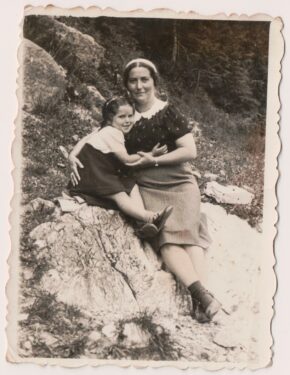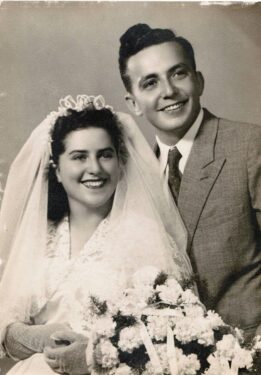WINDSOR TERRACE — Holocaust survivor Lea Balitzer Evron, 85, remembers the three-story apartment building and fur factory her father owned in Zywiec, Poland, and the small garden area she would play in as a child.
She also recalls the years she and her family fled their home in September of 1939 after the Nazis invaded Poland, going into hiding as a five-year-old. Though the names of some places and people are fuzzy, Evron remembers going to Ukraine, as well as ghettos in Tarnów and Warsaw, Poland.
Returning home to a new reality
Evron and her mother returned to Żywiec in 1944, only to be welcomed back with hatred.
“It was like a block or a block and a half walk to the building [from the train station]. While we were walking, a woman came across, stopped us, and said, ‘Look at this. Hitler promised us to get rid of all the Jews. And here they are coming back,’ ” Evron told The Tablet. “That was the welcome home.”

The building’s first two floors, where her family once lived, were occupied by other individuals and families. Evron and her mother were allowed to live upstairs in the maids’ room, located on the third floor.
Given the hostile reception they received, Evron said her mother feared for her daughter’s safety because she would be the only Jewish girl in the local school. According to Evron, her mother told the school’s priest that Evron had converted to Catholicism.
“When she came home, she told me, ‘But I didn’t understand the whole thing,’ ” she said. “She told me, ‘You will have to go every Sunday to church and do whatever all your friends do.’ ”
Evron entered the fourth grade under this new guise and even received First Holy Communion. She also formed an unlikely friendship with the priest.
“The priest was so nice and so good, and he took care of me. Whenever we were in a group, I had to stand next to him,” Evron explained. “If he knew or if he didn’t know [that I was Jewish], I don’t know.”
At that same time, Evron’s mother wrote letters to her sister-in-law in Switzerland, plus her husband’s brother-in-law in the United States. They sent packages filled with food and other items, some of which Evron’s mother sold to get extra money. Evron and her mother left Poland in January of 1947.
They lived in Sweden for a year and later moved to Switzerland, where Evron continued her education and learned French. The two then moved to Israel three years later, where Evron’s paternal uncle lived. It was there that she met her husband Jehuda and had three sons. Evron’s family immigrated to the United States in 1982.
A three-decade legal fight

Evron and her husband, 88, have been fighting to regain ownership of her family’s two properties for the last 32 years since Poland became a democratic country. They traveled to the country about 15 years ago, discovering that the apartment building and factory had been turned into office space and a shopping mall. Evron said an employee allowed her to come inside and see what the place had become.
“The apartment where I lived [on the first floor] was an office, but I couldn’t see anything else in the building,” Evron told The Tablet. “They didn’t let me in.”
Evron’s husband explained that he and his wife have hired at least four attorneys since then to help recover the properties.
“The first three lawyers said they could not do anything,” Jehuda said. “But this last lawyer succeeded in getting a verdict ruling from the court that Poland has to return the property to my wife because he found that actually the factory and building are in her name.”
Though Poland’s Supreme Court ruled in favor of Evron, Jehuda said Poland’s Ministry of Finance declared nothing could be done because the new owner had bought the property in good faith from the government.
“I understand that Poland is not responsible, but all I have are promises, promises, promises. [The lawyer’s] trying now to get monetary compensation, but so far nothing has happened,” Jehuda continued. “I think it cost us more money [with legal fees] than what the value of the property is. But it’s a question of principle because Poland suffered so much from Nazi Germany and then the Russian communists.”
Poland is the only major country in the former Soviet bloc, and member state of the European Union, that doesn’t have any national legislation providing restitution of confiscated private property.
“No one is suggesting that Poland has any responsibility for what the Nazis did. Poland was a victim country,” World Jewish Restitution Organization (WJRO) Chair of Operations Gideon Taylor clarified. “What we’re talking about is property that was confiscated from Holocaust survivors, after the war, by the Polish communist authorities.
“And we’re talking about compensation for that property, as it was at the time, after the war, even if it was destroyed by the Nazis. The compensation survivors seek is for the property because it was after the war when the communists took it.”
#MyPropertyStory Sheds Light on Journeys
WJRO — established by leading world Jewish organizations in 1993 to address the restitution of Jewish property — represents world Jewry in pursuing claims for the recovery of Jewish properties in Europe (outside of Germany and Austria). Taylor explained that, for many Holocaust survivors, these properties are the last tangible connection to the world they once knew before the Holocaust.
Like Evron, some have tried to go through the courts, using specific provisions of the law or looking into if communist authorities properly carried out confiscations in the late 1940s and 1950s. However, few survivors have succeeded.
“The main reason people won’t succeed is that most don’t even try to go to court,” Taylor said. “There’s no national legislation that says you can go back and reclaim your property or get compensation for your property. There needs to be a national approach.”

To shed light on these stories, WJRO launched the #MyPropertyStory social media campaign last year. Evron and other survivors took part in the campaign and shared memories, family histories, and battles with trying to recover properties. This year, WJRO expanded the campaign — renaming it #MyPropertyStory: The Next Generations — to include survivors’ children and grandchildren.
“This campaign offers a unique opportunity for people to share and connect with one another — focusing on how the injustices of lives that were forever changed by the Holocaust have affected Jewish families across generations,” Taylor said.
The Evrons, who currently live in Queens, said they will keep fighting.
